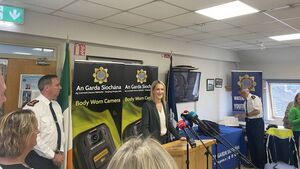Garda body-worn cameras launched in Waterford City

Minister for Justice Helen McEntee speaks at Waterford Garda Station.
Gardaí in Waterford City have officially begun using body-worn cameras.
Minister for Justice Helen McEntee and outgoing Garda Commissioner Drew Harris came to Waterford Garda Station to launch the rollout of body-worn cameras for members of An Garda Síochána.
200 body-worn cameras are now in use at Waterford Garda Station.
Plainclothes members of An Garda Síochána will form part of the proof of concept in Waterford.
At the launch, Commissioner Harris said: "Today's launch marks the final stage in our proof of concept phase, which brings us one step closer to the implementation of 'Information-Led Policing'.
"It follows extensive consultation with over 20 other police services around the world and the commencement of the Garda Síochána (Recording Devices) Act 2023, which includes the Codes of Practice for their operation.
He added: "The proof of concept will continue with a period of analysis and engagement with the frontline members. This will help us to understand and evaluate the cameras and Digital Evidence Management System. We will also continue to engage with the DPP (Director of Public Prosecutions) to assess how this video evidence can be utilised in the prosecution of cases through the courts."
Minister McEntee said: "I want every member across the country to have body cameras for two very clear reasons. They're absolutely vital in making sure that we can provide every piece of equipment and technology that's available to us to An Garda Síochána to do their job as effectively as possible.
"It's important in keeping our Gardaí safe as they go about the job in a dutiful and respectful way... that they can't be called into question as can often be the case where there's no other evidence."
"There's a lot of money being invested in technology overall. There's €155 million going into ICT for members from An Garda Síochána alone this year.
She added: "They're no stranger to pilots here in Waterford. We have Waterford as one of our community safety partnerships, which has been running for the past year."
The Waterford News & Star asked Minister McEntee how the cameras could impact the policing of public order incidents.
Minister McEntee responded: "We have seen an escalation and a rise in violent disorder, in arson and attacks on members of An Garda Síochána and I think the way in which Gardaí respond, in which they are trained to respond in a graduated way, I think has been absolutely exemplary."
She continued: "We've used [body-worn cameras] in Coolock recently, they will be an assistance to members of An Garda Síochána, coupled with, I hope in the future, the introduction of facial recognition, which would be allowed for violent disorder and riot as well."
Over 600 Gardaí have been trained in the use of body-worn cameras.
Commissioner Harris told the News & Star: "We're onto the third generation of body-worn cameras, each image is in effect watermarked against date, time, but also against the unique identifier for that Garda member. All of that footage then is protected, and when the camera is docked, it goes to a central depository where it's held very securely, so it can't actually then be adulterated or alternated or altered."
Garda Sergeant Peter Clifford spoke about the Garda response to the roll out, and the positive impact that the cameras could have for legal procedure.
He said: "They'd be very helpful in public order situations. It'll really be a benefit because I think it might de-escalate situations if someone realises that they're being filmed, they might be able to de-escalate before situations get worse."
"Having been trained properly, now we're pretty confident in using the actual software itself. So, if you're down in town and something happens, you're confident in yourself that you know what to do."
Sergeant Clifford went on: "If you were to engage with a member of the public and you were going to use the camera, you give an oral warning to them. It's up to the Garda to decide whether he needs to use it or requires it in that situation."






